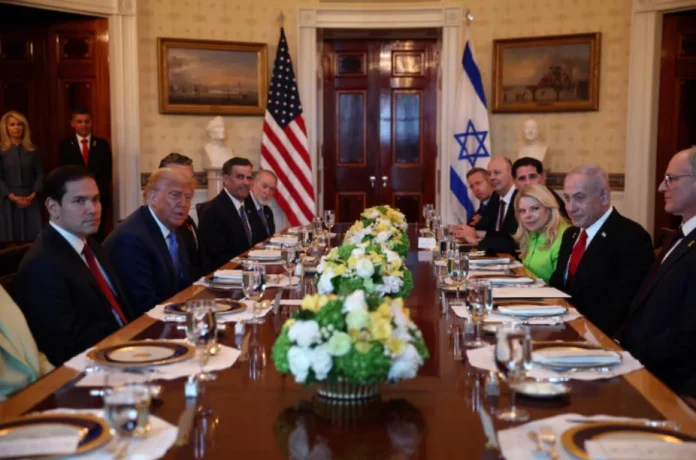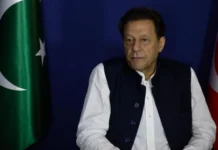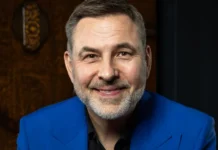
Israeli Prime Minister Benjamin Netanyahu met with U.S. President Donald Trump at the White House on Monday as Israel and Hamas continue indirect ceasefire negotiations amid rising international pressure to end the 21-month war in Gaza.
The two leaders dined privately with top advisers in the White House’s Blue Room, where discussions focused on a possible ceasefire deal, humanitarian relief, regional diplomacy, and a controversial proposal to relocate Palestinians from Gaza.
“We’re working with the United States very closely about finding countries that will seek to realize what they always say that they wanted to give the Palestinians a better future,” Netanyahu said, suggesting that some Gazans may be relocated to neighboring nations. “If people want to stay, they can stay, but if they want to leave, they should be able to leave.”
Trump, initially cautious when asked about the relocation plan, confirmed regional cooperation. “We’ve had great cooperation from every surrounding country,” he said. “Something good will happen.”
The president, who earlier this year proposed transforming Gaza into the “Riviera of the Middle East,” has faced criticism from Palestinians and human rights groups who condemned the idea as ethnic cleansing.
Netanyahu’s visit coincides with critical indirect negotiations in Doha, Qatar, where U.S.-backed mediators are trying to secure a phased deal involving hostage releases, Israeli military withdrawals, and talks toward ending the conflict. U.S. envoy Steve Witkoff, a key architect of the current 60-day ceasefire proposal, is set to join the Qatar talks later this week.
Netanyahu told Trump he was optimistic about progress. Trump, who said he would be “very firm” with the Israeli leader, believes a breakthrough could be imminent, especially in the aftermath of Israel’s brief war with Iran, during which the U.S. launched strikes in support of Israeli operations.
Meanwhile, outside the White House, hundreds of protesters gathered waving Palestinian flags and demanding a halt to U.S. military support for Israel. Chants of “Stop Arming Israel” and calls for Netanyahu’s arrest, referencing the ICC warrant against him, echoed across Lafayette Square.
Earlier in the day, Netanyahu met with Secretary of State Marco Rubio and delivered a letter nominating Trump for the Nobel Peace Prize. On Tuesday, he is scheduled to meet Vice President JD Vance and address congressional leaders on Capitol Hill.
Despite renewed diplomacy, challenges remain. Palestinian sources told Reuters that Israel’s restrictions on aid entry into Gaza remain a core sticking point. Israel maintains it is allowing humanitarian supplies, but insists on controlling access to prevent aid diversion by Hamas.
Gaza’s humanitarian crisis continues to worsen. The enclave’s health ministry reports over 57,000 Palestinians killed since the war began in October 2023, when Hamas attacked southern Israel, killing around 1,200 people and taking 251 hostages. Some 50 hostages remain in Gaza, 20 of whom are believed to be alive.
Netanyahu, under domestic and international pressure, faces resistance from hardline coalition partners opposed to a ceasefire. Still, growing war fatigue among Israelis could bolster his government’s willingness to accept a deal under the right terms.
Meanwhile, Trump confirmed that his administration has scheduled talks with Iran, signaling a potential diplomatic opening after the recent escalation. “They want to talk,” Trump said. “They took a big drubbing.” He added he would consider lifting sanctions on Iran “at the right time.”
As efforts intensify on multiple fronts, Gazans like displaced resident Abu Suleiman Qadoum remain desperate. “It has totally become unbearable,” he said. “I ask God that the mediators pressure with all their strength to solve this issue.”
Written By Rodney Mbua


















